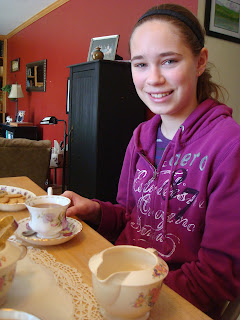We are up to the Revolutionary War in history, which is staggering to me considering that we started the year at the fall of the Roman Empire, around 400 A.D. Last week we had a tea party! While we drank our tea we discussed all the various taxes that King George III and the British Parliament levied on the colonies, and the reasons for the colonists' initial rebellion against the crown. We also talked about the role of tea in the colonists' lives, and how to behave properly while drinking it.
We tend to associate tea parties now with little girls, but in colonial times both women and men drank tea on a daily basis. In addition to being a staple drink, the process of making, serving, and drinking tea was something of an "event" and a social convention. I don't have a tea strainer large enough to steep an entire pot at once, so we used tea bags, but we discussed how the tea the colonist's purchased would have been loose tea.
We also talked about what they would have put in their tea to sweeten it. Most likely honey rather than sugar, as sugar was largely imported and therefore very expensive. We pretended that I was a wealthy colonist, so we had both honey and sugar available. :-) Several of the children were brave enough to try milk (our substitute for cream) in their tea as well.
We practiced good manners at the table!
From our reading we learned that the colonists were not just upset that the crown had taxed their tea and many other daily household items, but that they had taxed them without the colonists having representation in Parliament. And they had taxed only the British colonists, not the British subjects living in Britain. Many of the colonists, even at the start of the war, still considered themselves loyal British citizens. If King George III had allowed them representation in Parliament, it is entirely possible that the Revolutionary War would not have happened at that time.
After the Boston Massacre in 1770, and the various taxes that were levied both before and after that time, tensions increased almost to the breaking point. The breaking point came when the British responded to the infamous Boston Tea Party by closing the port of Boston to all ships, and posting soldiers on the narrow spit of land connecting the peninsula of Boston to greater Massachusetts, thereby severely restricting the flow of merchandise into Boston, and controlling who went in and who went out. The people of Boston had their very own version of The Starving Time (original starving time happened during the winter of 1610 at the Jamestown Colony in Virginia).
Forget tea, they could not get basic food supplies. Shops could not replenish their shelves and soon there was nothing to buy. No raw materials for any of the trades could be obtained. Work came to a standstill. Many people lost everything they had. Sickness was rampant and many people died. Much as a parent may punish a rebellious child too harshly and wound their spirit, King George did not know that his heavy hand would wound the feelings of loyalty so deeply there was no turning back.
It was perfect timing that Paul Revere's midnight ride happened the night of April 18, and the morning of April 19, 1775, exactly 237 years before our little tea party! The first shots of the Revolutionary War were fired at Lexington on April 19, a few hours after Paul's ride had ended.
Then this past week we learned about the early battles of the Revolutionary War. How and where it started. Such gripping tales can be told of those early battles! It is so unlikely that the colonists would have had early success, but they did. We passed around a poetry book, taking turns reading Longfellow's poem Paul Revere's Ride.
I love that poem, and the last paragraph bears repeating:
"So through the night rode Paul Revere,
And so through the night went his cry of alarm
To every Middlesex village and farm -
A cry of defiance and not of fear,
A voice in the darkness, a knock at the door,
And a word that shall echo forevermore!
For, borne on the night-wind of the past,
Through all our history to the last,
In the hour of darkness and peril and need,
The people will waken and listen to hear
The hurrying hoofbeats of that steed,
And the midnight message of Paul Revere."


















1 comment:
I just heard Adam Andrews recite this poem at our homeschool convention two weekends ago. There's just something about the way he reads it with such inflection that sent a chill of excitement down my spine. If you ever get the chance to hear him read it, I highly recommend it.
Post a Comment